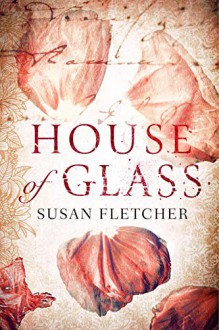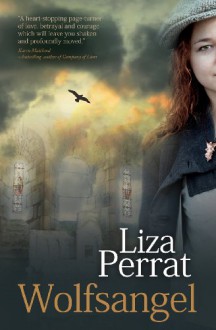
Thanks to NetGalley and to Little, Brown Book Group UK for providing me an ARC copy of this book. I was later contacted by Kimberley Nyamhondera suggesting I take part in the blog tour for the launch of the book, and as I knew the author I immediately agreed.
I had read and reviewed another one of Susan Fletcher’s books (Let Me Tell You About a Man I Knew, you can read my review here) a couple of years ago and loved it. When I checked my review, to remind myself what I had thought about it in more detail, I realised I could use almost word by word the same title for my review, although the subject of the novel is quite different. “A beautiful, contemplative, and touching novel.” Yes, this definitely applies to House of Glass as well. This time the story is set in the UK right before the breaking of the First World War, and in fact, there are rumours spreading about its likelihood already when the novel starts. It is a fascinating time, and the life of the protagonist, Clara Waterfield, is deeply affected by the historical period she has to live in, from her birth in very late Victorian times, to what would be a very changed world after the Great War, with the social upheaval, the rapid spread of industrialization, the changing role of women, and the all-too-brief peace.
Clara, who tells the story in the first person, is a great creation, who becomes dearer and dearer to us as we read the book. This is not a novel about a protagonist who is fully-formed, recognisable and unchanging, and runs across the pages from one action scene to the next hardly pausing to take a breather. Clara reflects upon her past (although she is very young, she has suffered greatly, but not lived much), her condition (she suffers from osteogenesis imperfecta, brittle bones, and that meant that she was kept indoors and not exposed to the risks and dangers of the outside world, the London streets in her case throughout her childhood), her family, and life experiences or her lack of them. No matter what she looks like, her short stature, her difficulty walking, her limitations in physical activity, this is a determined woman, make no mistake. She has learned most of what she knows through books (non-fiction mostly, although she enjoyed the Indian tales her mother used to read her), she has experienced not only pain, but other kinds of loses, and there are secrets and mysteries surrounding her, but despite all that, she is all practical and logical when we meet her. Her lack of exposure to the real world makes her a fascinating narrator, one who looks at everything with the eyes of a new-born or an alien suddenly landed in our society, who might have theoretical knowledge but knows nothing of how things truly work, while her personality, determined and stubborn, and her enquiring nature make her perfect to probe into the mystery at the heart of Shadowbrook.
Readers might not find Clara particularly warm and engaging to begin with (despite the sympathy they might feel for her suffering, something she would hate), as she dispenses with the niceties of the period, is headstrong and can be seen as rude and unsympathetic. At some point, I wondered if there might have been more to her peculiar personality than the way she was brought up (she can be obsessive with the things she likes, as proven by her continuous visits to Kew Gardens once she discovers them, and her lack of understanding of social mores and her difficulty in reading people’s motivations and feelings seemed extreme), but she quickly adapts to the new environment, she thrives on change and challenges, she shows a great, if somewhat twisted, sense of humour at times, and she evolves and grows into her own self during the novel, so please, readers, stick with the book even if you don’t connect with her straightaway or find her weird and annoying at times. It will be worth your while.
Her point of view might be peculiar, but Clara is a great observer of people and of the natural world. She loves her work and she is careful and meticulous, feeling an affinity for the exotic plants of the glass house, that, like her until recently, also have to live enclosed in an artificial environment for their own safety. That is partly what enhances their beauty and their rarity in our eyes. By contrast, Clara knows that she is seen as weird, lacking, less-able, and hates it. She is a deep thinker and reflects upon what she sees, other people’s behaviours, she imagines what others might be talking about, and dreams of her dead mother and soon also of the mystery behind the strange happenings at the house.
The novel has been described as gothic, and that is a very apt description, even though it is not always dark and claustrophobic. There are plenty of scenes that take place in the garden, in the fields, and in the open air, but we do have the required strange happenings, creaks and noises, scratches on doors, objects and flowers behaving in unpredictable fashion, previous owners of the house with a troublesome and tragic past, a mysterious current owner who hides something, violence, murder, and plenty of rumours. We have a priest who is conflicted by something, a loyal gardener who knows more than he says, a neighbouring farmer who has plenty of skeletons in his closet, and a housekeeper who can’t sleep and is terrified. But there is much more to the novel than the usual tropes we have come to expect and love in the genre. There is social commentary; there are issues of diversity and physical disability, discussions about religious belief and spirituality, and also about mental health, women’s rights, and the destructive nature of rumours and gossip, and some others that I won’t go into to avoid spoilers.
I don’t want to give anything away, and although the story moves at a steady and contemplative pace, this in no way makes it less gripping. If anything, the beauty of the language and the slow build up work in its favour, giving us a chance to get fully immersed in the mood and the atmosphere of the place.
I marked a lot of passages, and I don’t think any of them make it full justice, but I’ve decided to share some, nonetheless:
She’d also said that there was no human perfection; that if the flaw could not be seen physically, then the person carried it inside them, which made it far worse, and I’d believed this part, at least.
For my mother had never spoken well of the Church. Patrick had said nothing at all of it. And my own understanding had been that imperfect bodies were forms of godly punishment; that imperfect meant I was worth less somehow. I’d disliked this notion intensely. Also, I was not a spare rib.
I could not taste fruit from studying a sketch of it, cut in half. What use was only reading of acts and not doing them? Knowing the route of the Ganges was not the same as standing in it.
The ending… We find the solution to the mystery, (which I enjoyed, and at the time I wondered why the book did not finish at that point) but the novel does not end there, and we get to hear what happened in the aftermath of the story. And yes, although at first, I wasn’t sure that part was necessary, by the end of the book proper I was crying and felt as if I was leaving a close friend in Clara, one that I was convinced would go on to lead a happy life.
Another fantastic novel by Susan Fletcher, one I recommend to fans of gothic novels, of Daphne du Maurier’s Rebecca and her other novels, of Sarah Waters’ The Little Stranger, and of inspiringly gorgeous writing. I do not recommend it to readers who prefer an action-laden plot with little space for thought or reflexion, although why not check a sample of the book and see for yourselves? I must catch up on the rest of the author’s novels and I hope there will be many more to come.

 Log in with Facebook
Log in with Facebook 









